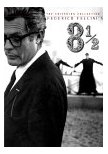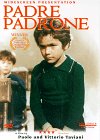videos - italian drama
Tug at your heartstings and learn some new lessons as you enjoy passionate Italian drama
videos.
 DVD &Fellini's 81/2, starring Marcello Mastroianni
DVD &Fellini's 81/2, starring Marcello Mastroianni
We follow Guido who is trying to make a film, but lacks inspiration, and cannot focus or find answers, as everyone in his life frustrates him. The world confuses him, as he is confused inside as well. He uses fantasies, and past memories, to confront his hectic situation, and come out with meaning, and understanding. This film can be confusing, as the film weaves between reality and the subjective fantasies of Guido. There is a lot of philosophy and reflection. Overall this is a very meaningful film which beckons multiple viewings -- and offers different interpretations for each.
VHS
 Il Sole Anche di Notte (Night Sun), directed by Vittorio and Paolo Taviani
Il Sole Anche di Notte (Night Sun), directed by Vittorio and Paolo Taviani
Young nobleman Baron Sergio Giuramondo, after discovering that his bride-to-be was the king's mistress, leaves Naples in disgust to become a monk. But his quest for perfect solitude is constantly interrupted by visitors hearing rumours that Sergio possesses miraculous powers, and by women who bet each other that they can successfully seduce him... This is an evocative film about an idealistic, sensitive young man (Sands), who wishes to find inner peace in a world of temptation. Based on the Tolstoi story "Father Sergius"; Sands' voice is dubbed into Italian by Giancarlo Giannini.
Subtitled in English.
 Gladiator, starring Russell Crowe
Gladiator, starring Russell Crowe
Politics, blood, battles, action, are just a few elements that this huge epic movie provides. It�s not another Ben-Hur, it is The Gladiator. The Visual Effects and sound, are the best ones I�ve seen and heard. It�s not only a 12 oscar nominee and 5 oscar winner including Best Picture, it is the best epic movie ever made. You are taken to Rome, into the battles, the politics and the Coliseum. Although the movie is not as deep as it could, Joaquin Phoenix gives an excellent performance as the Cesar, and gives the sense of Politics in such a way, that you enjoy the story of power that comes between him and Maximus. The scene where Comodus confronts his father is amazing, and the "Am I not Merciful?" scene provides an amazing feeling of madness surrounding Comodus. The Battle scene, the Coliseum scene and the City of Rome scene proves that Ridley Scott is one of the best directors ever. The music that the master Hans Zimmer made for the movie is shocking, and the most important thing of all, in one way or another, you enjoy the movie, the story, the music, and many other details.
also available in
 Padre Padrone, directed by Vittorio and Paolo Taviani
Padre Padrone, directed by Vittorio and Paolo Taviani
7-year-old Gavino is hauled off to the mountainous countryside of Sardinia where he's to live and labor with his father as a shepherd. In the country, the young boy toils at the behest of his emotionally cruel, physically abusive father. Sometimes a sleeping Gavino is rudely awakened and severely beaten for minor infractions of the old man's dictates. Solace comes in the form of isolation since camaraderie with neighboring shepherd boys incites parental anger. When a nearly adult Gavino tries to start a new life by emigrating to Germany, his father defeats this plan, ruining his attempt at happiness. Years of mistreatment and psychological insult lead Gavino to confront his tyrannical father on a childhood plagued by trauma and injury. This is a fantastic movie about the power that a father holds over his son due to his limiting the son's education and ability to communicate. The fact that Gavino Ledda went on to become a linguist shows the effect that his father had, as well as his determination to overcome the limitations set upon him. Also available in 
 Where Angels Fear to Tread, starring Rupert Graves and Helena Bonham Carter
Where Angels Fear to Tread, starring Rupert Graves and Helena Bonham Carter
This film is a comedy/tragedy based on E.M. Forster's first novel. As with all of Forster's novels, class distinctions and the situations which arise between them are the central focus of the film. Initially, what results from a newly widowed, young woman (Mirren), taking a trip to Italy and impulsively marrying the son of a local dentist, throws her staid in-laws into a tizzy, and makes for several comic scenes. However, when she has a child - the attempts of her in-laws to "save" the child from what they believe will be a poor upbringing has tragic consequences. All of the actors embody the characters as Forster must have envisioned ninety years ago - Judy Davis is especially good as the spinsterish Harriett and Barbara Jefford is an imposing Mrs. Herriton. Helen Mirren is luminous as the flightly, wayward Lilia and Giovanni Guidelli, as her handsome younger husband, is a perfectly likeable rogue. The locations in England and Italy are exquisite and the pace of the film keeps you guessing. The final tragedy and ending are especially bittersweet. Just like real life, things aren't always resolved neatly - but out of all the messiness can come true understanding and forgiveness. A wonderful, hopeful film.
 The Garden of the Finzi-Continis, directed by Vittorio De Sica
The Garden of the Finzi-Continis, directed by Vittorio De Sica
Set in northern Italy's Ferrara community at the outbreak of World War II, this classic film by Vittorio De Sica concerns an old, aristocratic Jewish family, the Finzi-Continis, who maintain their isolated, idyllic ways within the stone walls of their lush estate while Mussolini imprisons working-class Jews outside. The story's central figure, young Giorgio, is a middle-class Jew who has always found perfect sanctuary within the Finzi-Continis' walls and who is in love with his childhood friend from that family, Micol. Micol, however, is sexually restless and fit to burst for want of experiences impossible under government oppression. As Giorgio suffers his estrangement from her, De Sica traces the disintegration of a lost and beautiful way of life, slowly turning his focus from the privileged refuge of tennis courts and private libraries to police barriers and rooms where Jews await transport to concentration camps. This powerful work of memory tragically captures a loss of innocence on both the most personal and historical stages. In Italian with English subtitles
 The Tree of the Wodden Clogs (L'Albero degli zoccoli, 1978)
The Tree of the Wodden Clogs (L'Albero degli zoccoli, 1978)
The life inside a farm in Italy at the beginning of the century. Many poor country families live there, and the owner pays them by their productivity. One of the families has a very clever child. They decide to send him to school instead of make him help them, although this represents a great sacrifice. the boy has to wake up very early and walk several miles to get to the school. One day the boy's shoes break when returning home, but they do not have money to buy other. What will they do? These peasants really put late twentieth century American Catholics to shame through their actions.
The film slowly unveils to the viewers one year in the life of Italian peasants at the close of the nineteenth century.
Most American audiences will have to get used to the slow pace of the film. Even the humor is extremely subtle. Surprisingly, I enjoyed the pace. The pace was silent, peaceful, and steadfast just as the families are in the film. To me it is an escape (ironically an escape from an escape) from many of today's films that just explode with sound effects and rock music.
 Tales of Ordinary Madness (1983), starring Ben Gazzara & Ornella Muti
Tales of Ordinary Madness (1983), starring Ben Gazzara & Ornella Muti
Anarchistic Italian filmmaker Marco Ferreri adapts the novel by an American cult writer Charles
Bukowski -- General Tales of Ordinary Madness, to be precise -- in this sensuous, suggestive romp through the liquored-up and lascivious lower depths of Los Angeles.
Ben Gazzara stars as Charles, a self-destructive poet drinking himself to death as he trolls
skid row for sex and, maybe, salvation. Redemption appears -- or does it? -- in the rarified form of "the most beautiful woman in town" (Ornella Muti), a convent-bred prostitute. But return to drunken despair is but a heartbeat away.
Directed by Marco Ferreri, this 1981 film won four Italian Academy Awards and the San Sebastian Film Festival Grand Prize. Compelling, sometimes shocking, and explicit.
Also available in (by [email protected])
 Amore (1948), starring Anna Magnani, directed by Roberto Rossellini
Amore (1948), starring Anna Magnani, directed by Roberto Rossellini
Two related vignettes which deliberate on the nature of human love and emotional attachment, both starring Magnani in the key role. In 'The Miracle,' a suggestible, innocent young mother-to-be deeply believes that her child was divinely conceived. A woman adjusts to her newfound solitude after her lover leaves in 'The Human Voice,' based on the one-act play by Jean Cocteau.
The film is an homage to the great Anna Magnani, Roberto Rossellini's two-part film features the Italian actress in Cocteau's one-act play "The Human Voice," in which she speaks to an unseen lover on the phone, and the controversial "The Miracle," which casts her as a peasant who believes she has given birth to the new Messiah. In Italian with English subtitles.
Il Postino (The Postman), starring Massimo Troisi. Based on true events, Troisi plays a shy postman who strikes up an unlikely friendship with exiled Chilean poet Pablo Neruda (Philippe Noiret). Through Neruda's example and tutelage, the hero learns to think of his Italian fishing village in lyrical terms, as well as how to talk to women and even find the strength to take his political stands. Sweet as it is, the film finally pushes beyond its charming borders to become an even more complex and poignant story about the pain of growing into one's destiny.
 Stealing Beauty, directed by Bernardo Bertolucci. Liv Tyler as a 19-year-old beauty named Lucy who summers at a villa in Tuscany with a variety of artistic types who immediately respond to her inspirational innocence. An amateur poet who has decided it's time to lose her virginity, Lucy has come to Italy after the death of her mother, who visited this artist's refuge 20 years earlier. Several young Italian men find Lucy quite heavenly (she is, after all, Liv Tyler), and she's not immune to their attentions, but she'd rather spend time with a playwright (Jeremy Irons) who is dying of AIDS and therefore has something other than sex on his mind. Stealing Beauty creates a serene mood that's so soothing you'll want to book a flight to Tuscany immediately, just to soak up the setting's idyllic atmosphere. If you're in the right frame of mind, this movie is like a balm for the soul, and Tyler and Bertolucci can share the credit for making this two-hour vacation so charmingly relaxing.
Stealing Beauty, directed by Bernardo Bertolucci. Liv Tyler as a 19-year-old beauty named Lucy who summers at a villa in Tuscany with a variety of artistic types who immediately respond to her inspirational innocence. An amateur poet who has decided it's time to lose her virginity, Lucy has come to Italy after the death of her mother, who visited this artist's refuge 20 years earlier. Several young Italian men find Lucy quite heavenly (she is, after all, Liv Tyler), and she's not immune to their attentions, but she'd rather spend time with a playwright (Jeremy Irons) who is dying of AIDS and therefore has something other than sex on his mind. Stealing Beauty creates a serene mood that's so soothing you'll want to book a flight to Tuscany immediately, just to soak up the setting's idyllic atmosphere. If you're in the right frame of mind, this movie is like a balm for the soul, and Tyler and Bertolucci can share the credit for making this two-hour vacation so charmingly relaxing.
 The White Sheik (Lo Sceicco Bianco , 1952), directed by Federico Fellini, starring Alberto Sordi
The White Sheik (Lo Sceicco Bianco , 1952), directed by Federico Fellini, starring Alberto Sordi
While honeymooning in Rome, a young bride (Wanda),dazzled by glamour and illusion, escapes the security of her future by running off with a photo-novel actor who portrays a seductive "White Sheik", to whom she writes often signing herself as "the pasionate doll". Soon, she finds reality sneaking into her romantic fantasy.
Disappointed by the average quality of her idol, she goes back to her husband (Trieste) who, meanwhile, has initiated an affair with a prostitute (Cabiria) and her friend. This is the first film for which Fellini has completely responsibility as a director: Through the vicissitude of little provincial persons who discover factory-dreams, Fellini inaugurates that autobiographic element and that fancy inclination which will be constant of his cinemas. Sordi (the "White Sheik") is an irresistible seductor to excess while at the same time enslaved by his wife.
Look at Fellini's Sketches for this film.
 Big Night, Actor Stanley Tucci cowrote, codirected, and stars (along with Tony Shaloub) in this touching and funny parable about two brothers, Italian immigrants, who run an unsuccessful restaurant on the Jersey shore in the 1950s. Convinced by a thriving rival (Ian Holm) that jazz great Louis Prima will be stopping by their eatery for a late dinner after a show, the brothers pull out all stops and spend their last dollar organizing a banquet that ought to make culinary history. Expect to be very hungry after watching this delightful and touching film, but don't rush off to the kitchen until the full design of the characters and their relationships with lovers, suppliers, customers, and one another completes itself.
Big Night, Actor Stanley Tucci cowrote, codirected, and stars (along with Tony Shaloub) in this touching and funny parable about two brothers, Italian immigrants, who run an unsuccessful restaurant on the Jersey shore in the 1950s. Convinced by a thriving rival (Ian Holm) that jazz great Louis Prima will be stopping by their eatery for a late dinner after a show, the brothers pull out all stops and spend their last dollar organizing a banquet that ought to make culinary history. Expect to be very hungry after watching this delightful and touching film, but don't rush off to the kitchen until the full design of the characters and their relationships with lovers, suppliers, customers, and one another completes itself.



 DVD &Fellini's 81/2, starring Marcello Mastroianni
DVD &Fellini's 81/2, starring Marcello Mastroianni









